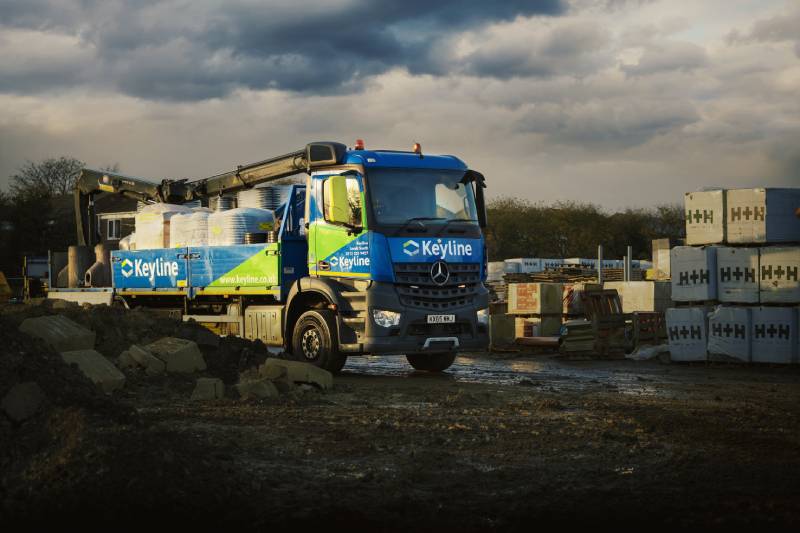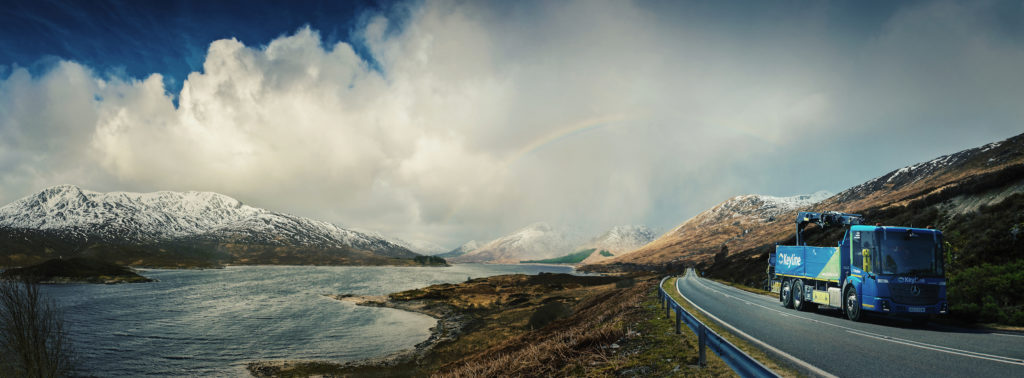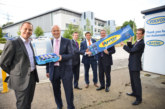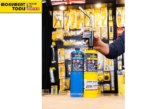
Steve Day, Regional Director at Keyline Civils Specialist, considers the role merchant vehicle fleets play in improving the construction industry’s safety and sustainability performance, explaining how the sector can deliver further improvements through a strong customer proposition that includes a level of excellence in driver training, employee engagement and fleet accreditation.
One element that all construction projects have in common is that materials need to be delivered to where they are needed on time and in a way that minimises the risk to those working on site, the drivers of the vehicles and any members of the public in the area. In addition to this, the impact of climate change and the very present issue of air quality need to be addressed by the industry as a whole.
And with the aim of contributing to the 2050 net zero carbon target, all businesses in the sector need to do their part in reducing carbon emissions and cutting pollution.
Despite significant improvements over recent decades, sadly construction is still one of the most dangerous industries in terms of injuries and fatalities. The delivery and unloading of materials can present hazards if not carried out correctly, especially where space is limited. These include the risk of workers being struck by moving or falling objects, falls from height and injuries caused by handling, lifting or carrying materials.
Consequently, it is important for clients to be assured that when making deliveries to site, merchants do so in the safest possible way to minimise the risks for those on site and also protecting the merchant’s own staff.
For merchants delivering to site, this includes looking at loading and unloading processes to understand where improvements can be made. The ultimate aim should be to remove the need for anyone to climb onto the vehicle bed during unloading. This will eliminate the risk of falls from the vehicle and minimise the chances of accidents with the movement of the loads.
For example, by pre-slinging the loads and using specially developed attachments for our vehicle mounted cranes, we have developed a process that allows the driver to remain on the ground at all times and for the delivery to be completed quickly.
In addition, as a sector, improving the carbon footprint of our activities is of course a key consideration. Indeed, on many larger projects, contractors commonly look for supply partners who can demonstrate that they are minimising their environmental impact. For merchant operations, an important part of reducing the environmental impact is improving the fuel efficiency of delivery vehicles — and a key factor in the vehicle’s performance is how it is driven.
Harsh accelerating and braking, higher speeds and unnecessary idling, for instance, can all impact fuel efficiency. Therefore, encouraging drivers to adopt better driving behaviours can lead to significant reductions in the amount of fuel used and carbon dioxide (CO2) emissions produced.
This can be achieved through a strategy of ongoing training and engagement with drivers. Training, such as Continuing Professional Development (CPD) modules, can help keep them up to date on best practice and provide a refresher on previous learning. It is also important to engage with drivers regularly on what is being achieved and how they are contributing, not only to reducing the business’ environmental impact, but also in terms of improving safety.
Also, offering bonuses to drivers based on their performance can help to encourage and embed these behaviours in everyday working. As an example, Keyline’s Driver Bonus Scheme has produced some excellent results — in each delivery vehicle, an electronic system monitors and scores the driver’s performance on every journey, with drivers rewarded for good practices.
In 2019, as a result of this scheme, we achieved a 12.5% improvement in miles per gallon (MPG) and 50% reduction in idling across the fleet. This means more than 297,000 litres of fuel have been saved — the equivalent of 781 tonnes of CO2. Road traffic collisions have also been reduced by 7%.
 Furthermore, one of the most effective ways of demonstrating excellence in fleet management to clients is through independent accreditations such as the Fleet Operator Recognition Scheme (FORS). This allows merchants to show they have made a commitment to improving vehicle safety, efficiency and environmental protection, especially where they have achieved the higher Gold level, which Keyline has held for a number of years.
Furthermore, one of the most effective ways of demonstrating excellence in fleet management to clients is through independent accreditations such as the Fleet Operator Recognition Scheme (FORS). This allows merchants to show they have made a commitment to improving vehicle safety, efficiency and environmental protection, especially where they have achieved the higher Gold level, which Keyline has held for a number of years.
Once again, although the scheme is voluntary, clients on larger projects are increasingly requiring suppliers to have FORS accreditation.
Finally, building a strong culture of development and ongoing improvement can help merchants react to challenges, such as those we have seen this year, that require practices to be adapted quickly. Where there is already a focus on complying with best practice in areas such as site safety and sustainability, new requirements can be adopted more easily.
Construction is a vital part of the UK economy, but it remains among the most dangerous of industries. Therefore, it is essential that we work together to protect everyone involved. We also have a responsibility to minimise our impact on the environment and slow the pace of climate change. With our crucial position in the supply chain, merchants have the power to help effect change in both areas — and it can start with simple measures such as adopting best practice in fleet management.
With this as part of a customer-focused service proposition the business will also benefit from stronger customer relationships, reduced costs and even improved employee retention and motivation through better engagement.
For more information on the Fleet Operator Recognition Scheme (FORS), go to: https://www.fors-online.org.uk/cms/









